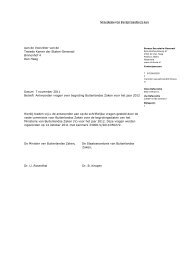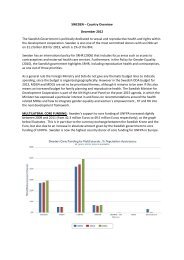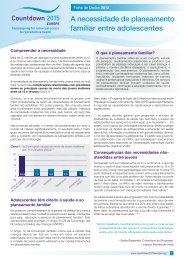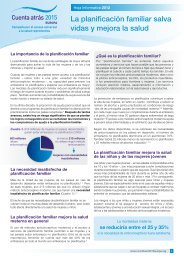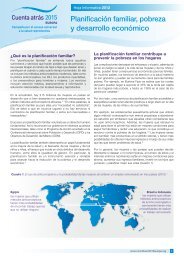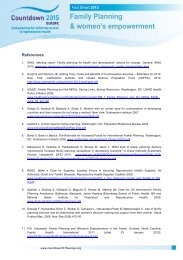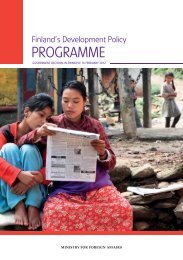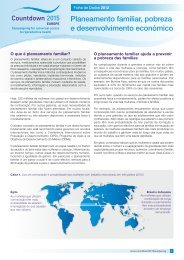The Unmet Need for Family Planning - Countdown 2015 Europe
The Unmet Need for Family Planning - Countdown 2015 Europe
The Unmet Need for Family Planning - Countdown 2015 Europe
Create successful ePaper yourself
Turn your PDF publications into a flip-book with our unique Google optimized e-Paper software.
6.2 Example talking pointsWhy should family planning be a priority <strong>for</strong> governments/donors?Audience: Ministers of Health and DevelopmentKey Statement: Maternal mortality is one of the biggest obstaclesto development.Supporting points: We know how to prevent it. When womenhave access to contraceptives, maternal mortality drops.Example: Bangladesh: maternal mortality fell by 40% aftercontraceptives were made available. Colombia: maternal mortalitydropped by 50%.Haven’t <strong>Family</strong> <strong>Planning</strong> programmes been a success?Why should we continue to invest?Audience: People with some knowledge of family planningKey Statement: Yes, family planning programmes have beensuccessful, but demand is increasing while budgets are falling.Supporting points: 222 million women in developing countrieswant to avoid pregnancies but cannot. <strong>The</strong> biggest generationever of young people are entering their reproductive years. Yetfunding <strong>for</strong> FP has fallen. We risk going backwards in terms ofmaternal deaths/ population/overburdened health systems.6.3 Example of a communication strategy <strong>for</strong> journalistsTarget: JournalistObjective: Persuade him/her to attend an event and write aboutunmet need<strong>The</strong>me: unmet need <strong>for</strong> family planningStart with flattery: For example, “You are a great advocate <strong>for</strong>women’s rights.”Provide a ‘hook’: For example, “Did you know that over 200million women do not have the ability to decide how manychildren to have? That’s over half the population of the USA.”Purpose: Explain the event or report that you would like him/herto write about.Proof points: “<strong>The</strong>se women don’t have access to in<strong>for</strong>mation,health services or contraceptive methods, which may be tooexpensive. Often women don’t have the right to make thedecisions themselves, and there is a lack of political will toaddress this issue, both from our governments and those indeveloping countries.(Support this with country examples.)What can we offer?: “We can give you access to this event,interviews with distinguished experts, and the latest in<strong>for</strong>mationabout these issues.”7. Case studiesIncreasing access to family planningIndia<strong>The</strong>re is evidence that maternal mortality has dropped in Indianstates where there are Accredited Social Health Activists(ASHAs). In some states, each village has an ASHA, who is theprimary distributor of in<strong>for</strong>mation and contraception, assistswith pregnancies and deliveries, and links pregnant women withgovernment services they may need.ASHAs support Anganwadi Workers, who provide nutritionalsupport to young mothers and children up to the age of five,and Auxiliary Nurses and Midwives, who provide support <strong>for</strong> safeinstitutional delivery.In each village, ASHAs are selected through a collectivedecision-making process involving women’s groups and religiousauthorities. ASHAs are usually married women with someeducation. <strong>The</strong>re is usually one ASHA <strong>for</strong> every 1000 people. Thisis a huge workload, especially considering that many ASHAs arevolunteers. However, in some cases honorariums are providedto ASHAs based on the number of clients they are able to referto other services.Local governments have been largely supportive of ASHAs, andthe scheme has now been extended to all 18 of India’s highlyvulnerable states. In addition, Concern Worldwide is taking stepsto introduce male ASHAs, which could help to increase men’sknowledge of and involvement in reproductive health and familyplanning.PakistanIn 1993, Pakistan initiated a programme to increase accessto basic health services, including contraceptive in<strong>for</strong>mationand services, in rural areas. Lady Health Workers are womenfrom the local community who visit other women in their homesand provide contraceptive in<strong>for</strong>mation and supplies, suchwww.countdown<strong>2015</strong>europe.org27




